Business Law Report: Analysis of UK Legal System for ESBM London
VerifiedAdded on 2020/06/03
|11
|3465
|41
Report
AI Summary
This report analyzes the English legal system and its implications for the European School of Business Management (ESBM) as it establishes a business school in London. It explores the different sources of law in the UK, including statutes, delegated legislation, common law, and EU law. The report details the role of the government in making laws, the application of statutory and common law, and the impact of employment and contract law on businesses. It also provides solutions for business issues, focusing on alternative dispute resolution methods such as mediation and arbitration. The report emphasizes the importance of complying with employment laws, such as those related to wages, health and safety, and non-discrimination, as well as contract law. The report considers the need for ESBM to comply with various laws for the establishment and regulation of its business operations in the country.
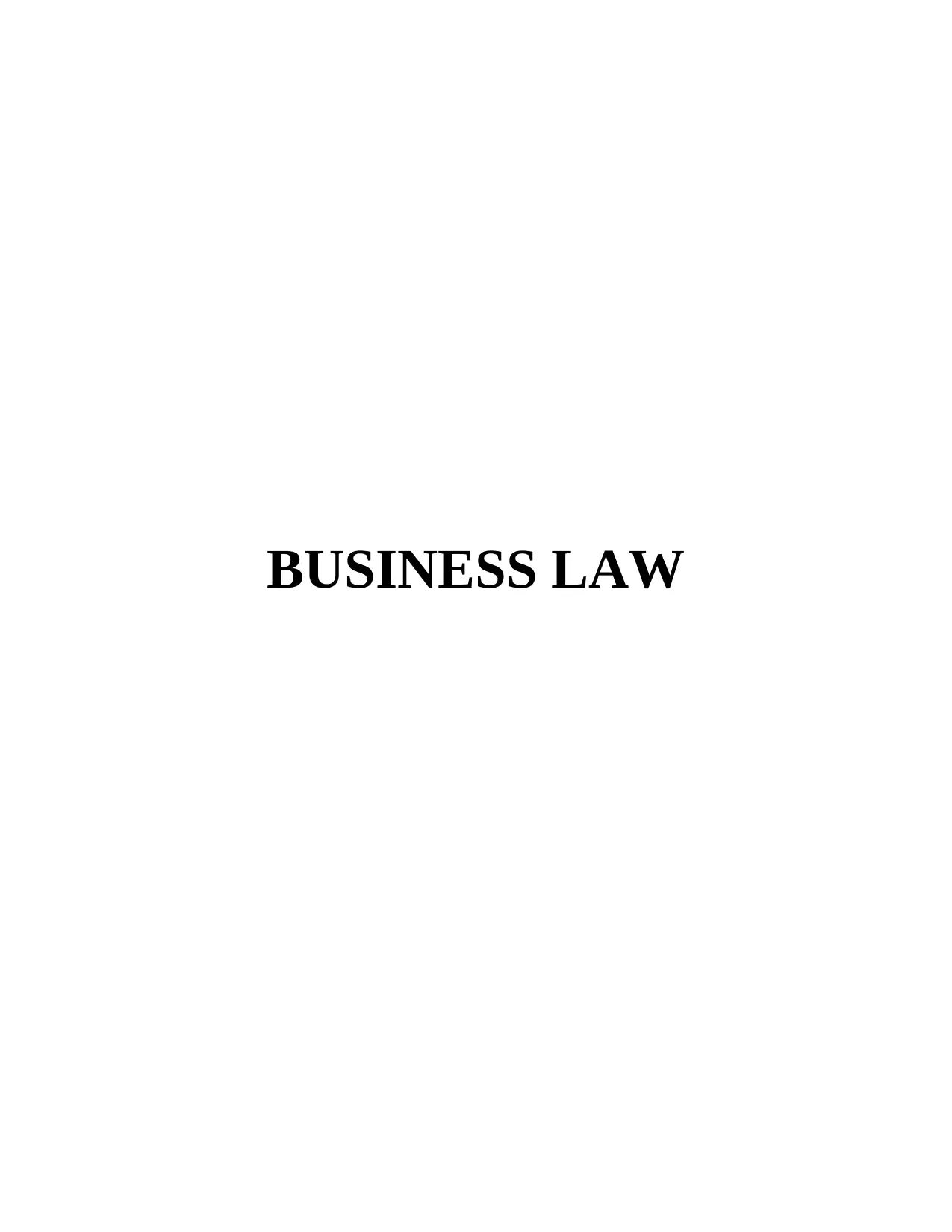
BUSINESS LAW
Paraphrase This Document
Need a fresh take? Get an instant paraphrase of this document with our AI Paraphraser
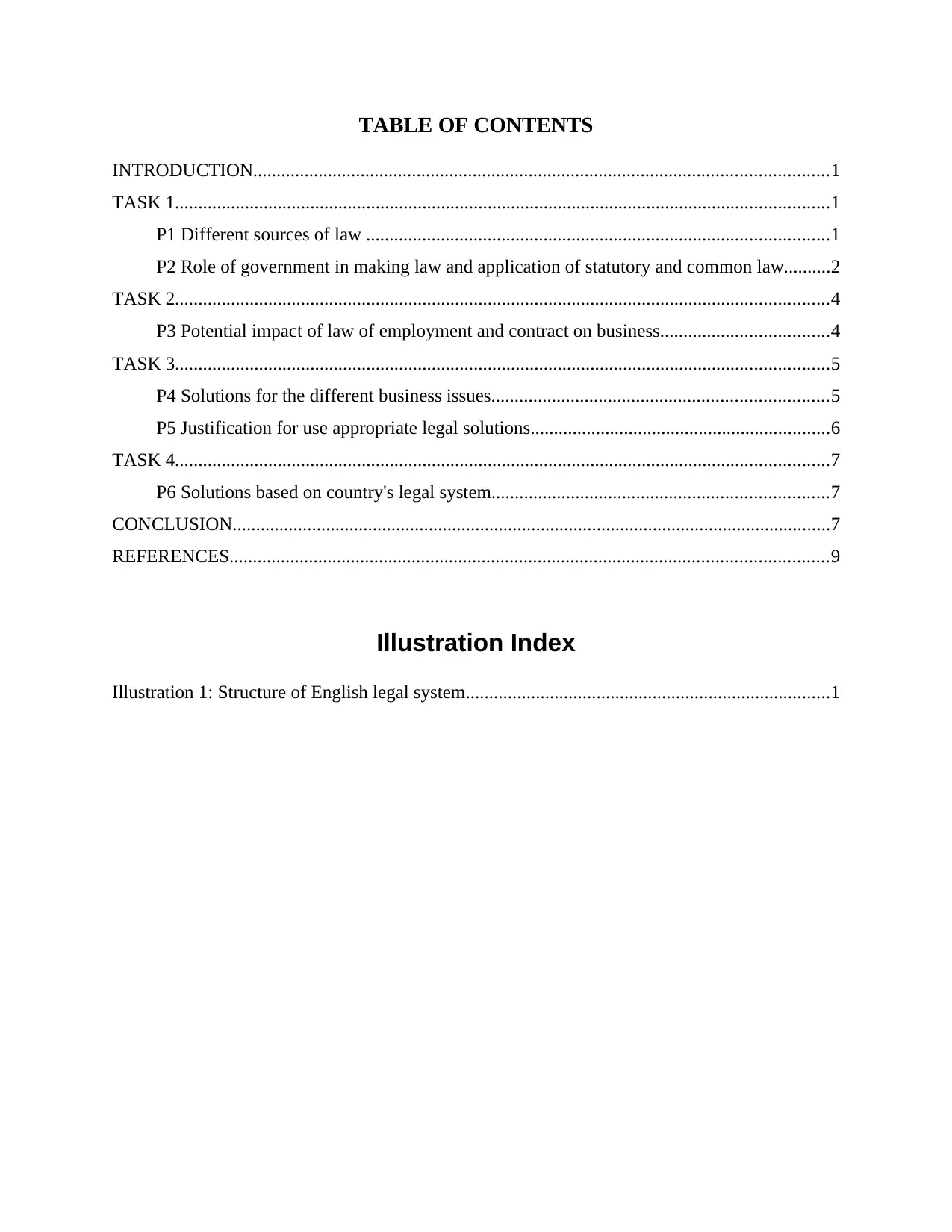
TABLE OF CONTENTS
INTRODUCTION...........................................................................................................................1
TASK 1............................................................................................................................................1
P1 Different sources of law ...................................................................................................1
P2 Role of government in making law and application of statutory and common law..........2
TASK 2............................................................................................................................................4
P3 Potential impact of law of employment and contract on business....................................4
TASK 3............................................................................................................................................5
P4 Solutions for the different business issues........................................................................5
P5 Justification for use appropriate legal solutions................................................................6
TASK 4............................................................................................................................................7
P6 Solutions based on country's legal system........................................................................7
CONCLUSION................................................................................................................................7
REFERENCES................................................................................................................................9
Illustration Index
Illustration 1: Structure of English legal system..............................................................................1
INTRODUCTION...........................................................................................................................1
TASK 1............................................................................................................................................1
P1 Different sources of law ...................................................................................................1
P2 Role of government in making law and application of statutory and common law..........2
TASK 2............................................................................................................................................4
P3 Potential impact of law of employment and contract on business....................................4
TASK 3............................................................................................................................................5
P4 Solutions for the different business issues........................................................................5
P5 Justification for use appropriate legal solutions................................................................6
TASK 4............................................................................................................................................7
P6 Solutions based on country's legal system........................................................................7
CONCLUSION................................................................................................................................7
REFERENCES................................................................................................................................9
Illustration Index
Illustration 1: Structure of English legal system..............................................................................1
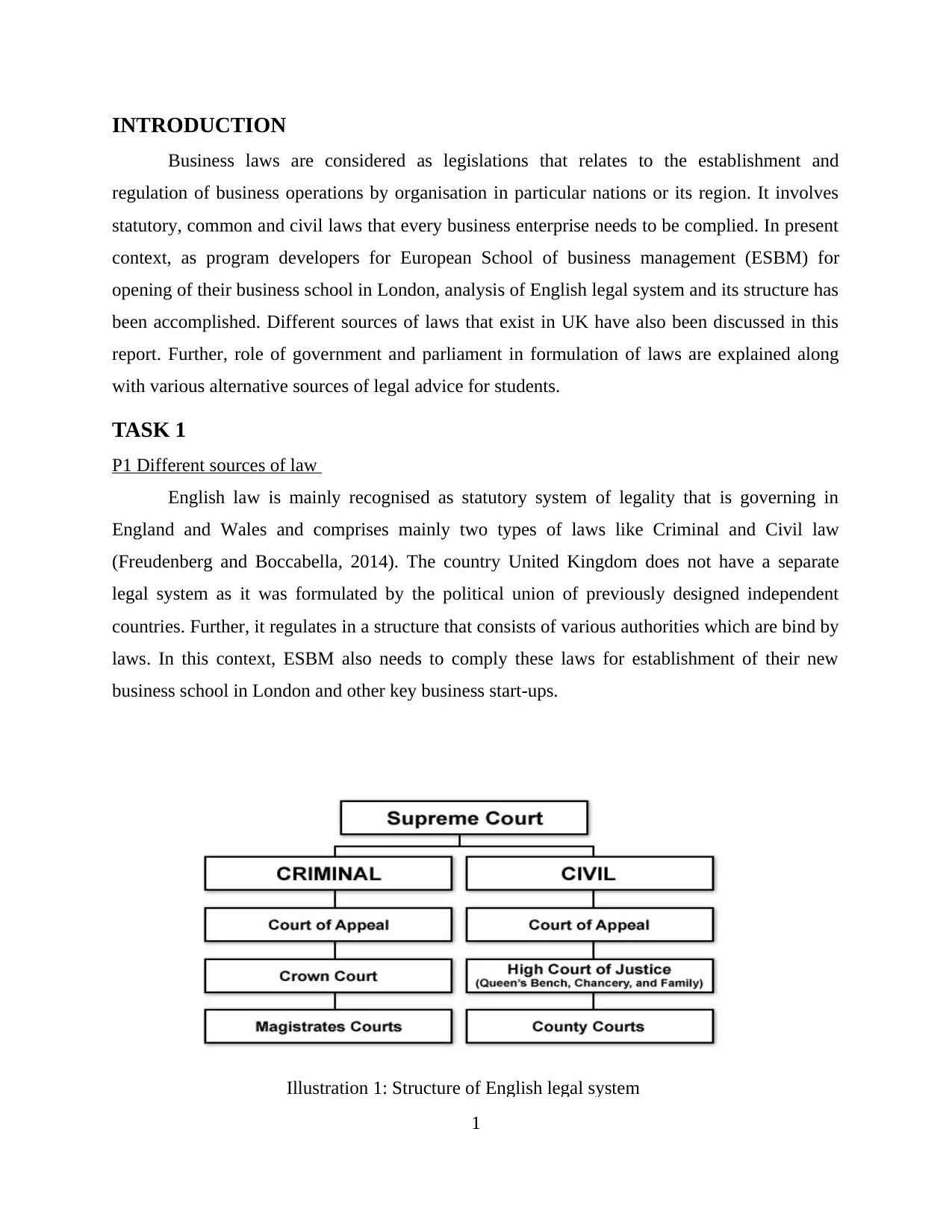
INTRODUCTION
Business laws are considered as legislations that relates to the establishment and
regulation of business operations by organisation in particular nations or its region. It involves
statutory, common and civil laws that every business enterprise needs to be complied. In present
context, as program developers for European School of business management (ESBM) for
opening of their business school in London, analysis of English legal system and its structure has
been accomplished. Different sources of laws that exist in UK have also been discussed in this
report. Further, role of government and parliament in formulation of laws are explained along
with various alternative sources of legal advice for students.
TASK 1
P1 Different sources of law
English law is mainly recognised as statutory system of legality that is governing in
England and Wales and comprises mainly two types of laws like Criminal and Civil law
(Freudenberg and Boccabella, 2014). The country United Kingdom does not have a separate
legal system as it was formulated by the political union of previously designed independent
countries. Further, it regulates in a structure that consists of various authorities which are bind by
laws. In this context, ESBM also needs to comply these laws for establishment of their new
business school in London and other key business start-ups.
1
Illustration 1: Structure of English legal system
Business laws are considered as legislations that relates to the establishment and
regulation of business operations by organisation in particular nations or its region. It involves
statutory, common and civil laws that every business enterprise needs to be complied. In present
context, as program developers for European School of business management (ESBM) for
opening of their business school in London, analysis of English legal system and its structure has
been accomplished. Different sources of laws that exist in UK have also been discussed in this
report. Further, role of government and parliament in formulation of laws are explained along
with various alternative sources of legal advice for students.
TASK 1
P1 Different sources of law
English law is mainly recognised as statutory system of legality that is governing in
England and Wales and comprises mainly two types of laws like Criminal and Civil law
(Freudenberg and Boccabella, 2014). The country United Kingdom does not have a separate
legal system as it was formulated by the political union of previously designed independent
countries. Further, it regulates in a structure that consists of various authorities which are bind by
laws. In this context, ESBM also needs to comply these laws for establishment of their new
business school in London and other key business start-ups.
1
Illustration 1: Structure of English legal system
⊘ This is a preview!⊘
Do you want full access?
Subscribe today to unlock all pages.

Trusted by 1+ million students worldwide
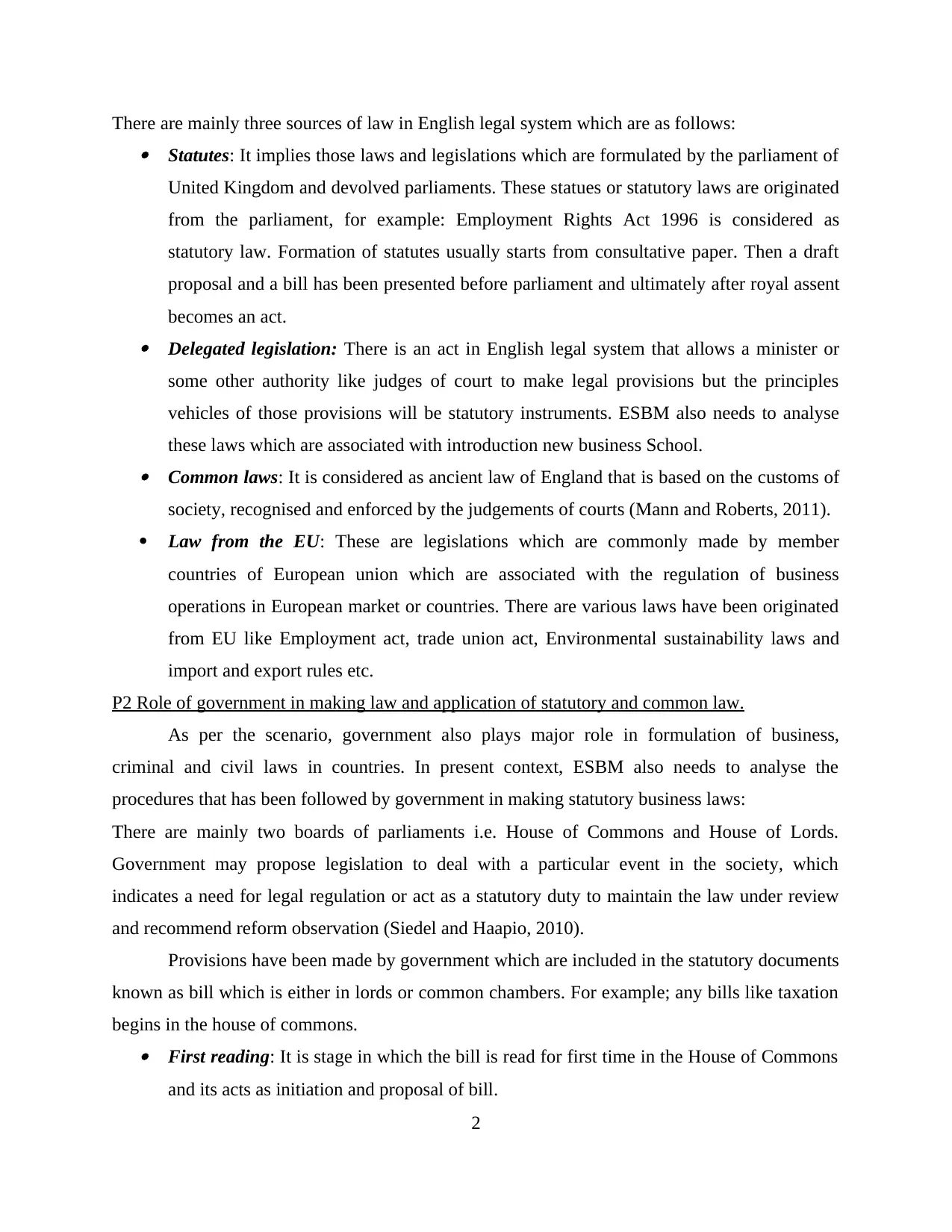
There are mainly three sources of law in English legal system which are as follows: Statutes: It implies those laws and legislations which are formulated by the parliament of
United Kingdom and devolved parliaments. These statues or statutory laws are originated
from the parliament, for example: Employment Rights Act 1996 is considered as
statutory law. Formation of statutes usually starts from consultative paper. Then a draft
proposal and a bill has been presented before parliament and ultimately after royal assent
becomes an act. Delegated legislation: There is an act in English legal system that allows a minister or
some other authority like judges of court to make legal provisions but the principles
vehicles of those provisions will be statutory instruments. ESBM also needs to analyse
these laws which are associated with introduction new business School. Common laws: It is considered as ancient law of England that is based on the customs of
society, recognised and enforced by the judgements of courts (Mann and Roberts, 2011).
Law from the EU: These are legislations which are commonly made by member
countries of European union which are associated with the regulation of business
operations in European market or countries. There are various laws have been originated
from EU like Employment act, trade union act, Environmental sustainability laws and
import and export rules etc.
P2 Role of government in making law and application of statutory and common law.
As per the scenario, government also plays major role in formulation of business,
criminal and civil laws in countries. In present context, ESBM also needs to analyse the
procedures that has been followed by government in making statutory business laws:
There are mainly two boards of parliaments i.e. House of Commons and House of Lords.
Government may propose legislation to deal with a particular event in the society, which
indicates a need for legal regulation or act as a statutory duty to maintain the law under review
and recommend reform observation (Siedel and Haapio, 2010).
Provisions have been made by government which are included in the statutory documents
known as bill which is either in lords or common chambers. For example; any bills like taxation
begins in the house of commons. First reading: It is stage in which the bill is read for first time in the House of Commons
and its acts as initiation and proposal of bill.
2
United Kingdom and devolved parliaments. These statues or statutory laws are originated
from the parliament, for example: Employment Rights Act 1996 is considered as
statutory law. Formation of statutes usually starts from consultative paper. Then a draft
proposal and a bill has been presented before parliament and ultimately after royal assent
becomes an act. Delegated legislation: There is an act in English legal system that allows a minister or
some other authority like judges of court to make legal provisions but the principles
vehicles of those provisions will be statutory instruments. ESBM also needs to analyse
these laws which are associated with introduction new business School. Common laws: It is considered as ancient law of England that is based on the customs of
society, recognised and enforced by the judgements of courts (Mann and Roberts, 2011).
Law from the EU: These are legislations which are commonly made by member
countries of European union which are associated with the regulation of business
operations in European market or countries. There are various laws have been originated
from EU like Employment act, trade union act, Environmental sustainability laws and
import and export rules etc.
P2 Role of government in making law and application of statutory and common law.
As per the scenario, government also plays major role in formulation of business,
criminal and civil laws in countries. In present context, ESBM also needs to analyse the
procedures that has been followed by government in making statutory business laws:
There are mainly two boards of parliaments i.e. House of Commons and House of Lords.
Government may propose legislation to deal with a particular event in the society, which
indicates a need for legal regulation or act as a statutory duty to maintain the law under review
and recommend reform observation (Siedel and Haapio, 2010).
Provisions have been made by government which are included in the statutory documents
known as bill which is either in lords or common chambers. For example; any bills like taxation
begins in the house of commons. First reading: It is stage in which the bill is read for first time in the House of Commons
and its acts as initiation and proposal of bill.
2
Paraphrase This Document
Need a fresh take? Get an instant paraphrase of this document with our AI Paraphraser
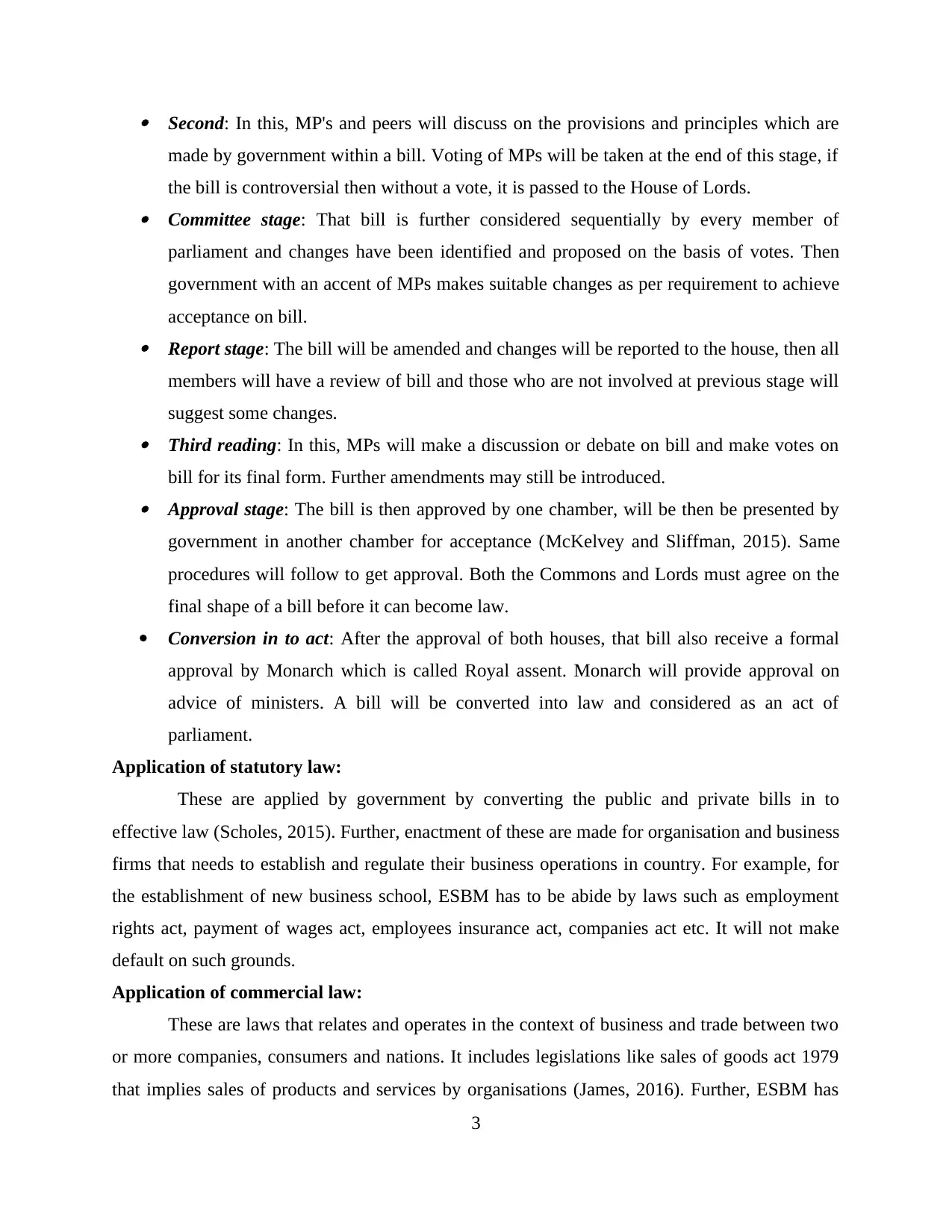
Second: In this, MP's and peers will discuss on the provisions and principles which are
made by government within a bill. Voting of MPs will be taken at the end of this stage, if
the bill is controversial then without a vote, it is passed to the House of Lords. Committee stage: That bill is further considered sequentially by every member of
parliament and changes have been identified and proposed on the basis of votes. Then
government with an accent of MPs makes suitable changes as per requirement to achieve
acceptance on bill. Report stage: The bill will be amended and changes will be reported to the house, then all
members will have a review of bill and those who are not involved at previous stage will
suggest some changes. Third reading: In this, MPs will make a discussion or debate on bill and make votes on
bill for its final form. Further amendments may still be introduced. Approval stage: The bill is then approved by one chamber, will be then be presented by
government in another chamber for acceptance (McKelvey and Sliffman, 2015). Same
procedures will follow to get approval. Both the Commons and Lords must agree on the
final shape of a bill before it can become law.
Conversion in to act: After the approval of both houses, that bill also receive a formal
approval by Monarch which is called Royal assent. Monarch will provide approval on
advice of ministers. A bill will be converted into law and considered as an act of
parliament.
Application of statutory law:
These are applied by government by converting the public and private bills in to
effective law (Scholes, 2015). Further, enactment of these are made for organisation and business
firms that needs to establish and regulate their business operations in country. For example, for
the establishment of new business school, ESBM has to be abide by laws such as employment
rights act, payment of wages act, employees insurance act, companies act etc. It will not make
default on such grounds.
Application of commercial law:
These are laws that relates and operates in the context of business and trade between two
or more companies, consumers and nations. It includes legislations like sales of goods act 1979
that implies sales of products and services by organisations (James, 2016). Further, ESBM has
3
made by government within a bill. Voting of MPs will be taken at the end of this stage, if
the bill is controversial then without a vote, it is passed to the House of Lords. Committee stage: That bill is further considered sequentially by every member of
parliament and changes have been identified and proposed on the basis of votes. Then
government with an accent of MPs makes suitable changes as per requirement to achieve
acceptance on bill. Report stage: The bill will be amended and changes will be reported to the house, then all
members will have a review of bill and those who are not involved at previous stage will
suggest some changes. Third reading: In this, MPs will make a discussion or debate on bill and make votes on
bill for its final form. Further amendments may still be introduced. Approval stage: The bill is then approved by one chamber, will be then be presented by
government in another chamber for acceptance (McKelvey and Sliffman, 2015). Same
procedures will follow to get approval. Both the Commons and Lords must agree on the
final shape of a bill before it can become law.
Conversion in to act: After the approval of both houses, that bill also receive a formal
approval by Monarch which is called Royal assent. Monarch will provide approval on
advice of ministers. A bill will be converted into law and considered as an act of
parliament.
Application of statutory law:
These are applied by government by converting the public and private bills in to
effective law (Scholes, 2015). Further, enactment of these are made for organisation and business
firms that needs to establish and regulate their business operations in country. For example, for
the establishment of new business school, ESBM has to be abide by laws such as employment
rights act, payment of wages act, employees insurance act, companies act etc. It will not make
default on such grounds.
Application of commercial law:
These are laws that relates and operates in the context of business and trade between two
or more companies, consumers and nations. It includes legislations like sales of goods act 1979
that implies sales of products and services by organisations (James, 2016). Further, ESBM has
3
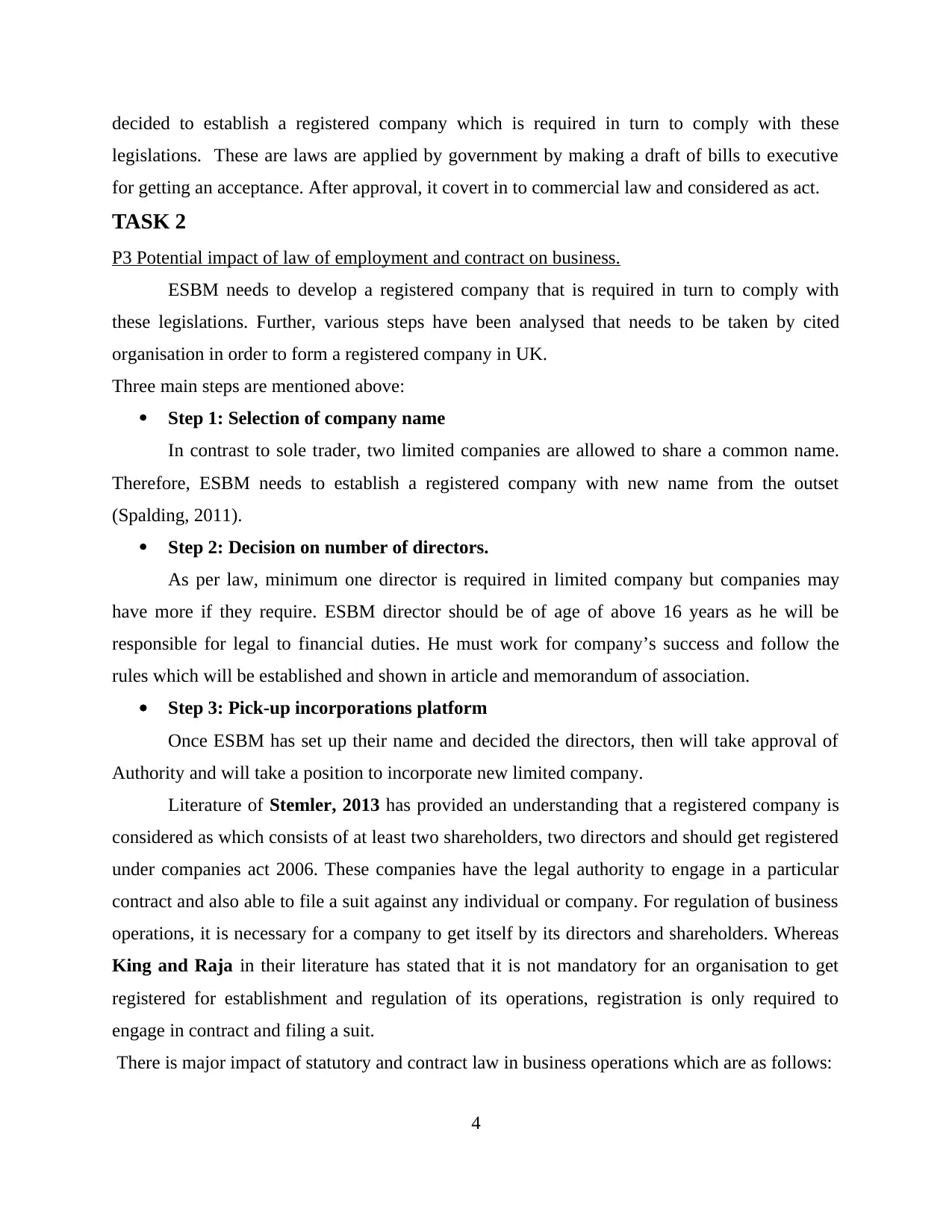
decided to establish a registered company which is required in turn to comply with these
legislations. These are laws are applied by government by making a draft of bills to executive
for getting an acceptance. After approval, it covert in to commercial law and considered as act.
TASK 2
P3 Potential impact of law of employment and contract on business.
ESBM needs to develop a registered company that is required in turn to comply with
these legislations. Further, various steps have been analysed that needs to be taken by cited
organisation in order to form a registered company in UK.
Three main steps are mentioned above:
Step 1: Selection of company name
In contrast to sole trader, two limited companies are allowed to share a common name.
Therefore, ESBM needs to establish a registered company with new name from the outset
(Spalding, 2011).
Step 2: Decision on number of directors.
As per law, minimum one director is required in limited company but companies may
have more if they require. ESBM director should be of age of above 16 years as he will be
responsible for legal to financial duties. He must work for company’s success and follow the
rules which will be established and shown in article and memorandum of association.
Step 3: Pick-up incorporations platform
Once ESBM has set up their name and decided the directors, then will take approval of
Authority and will take a position to incorporate new limited company.
Literature of Stemler, 2013 has provided an understanding that a registered company is
considered as which consists of at least two shareholders, two directors and should get registered
under companies act 2006. These companies have the legal authority to engage in a particular
contract and also able to file a suit against any individual or company. For regulation of business
operations, it is necessary for a company to get itself by its directors and shareholders. Whereas
King and Raja in their literature has stated that it is not mandatory for an organisation to get
registered for establishment and regulation of its operations, registration is only required to
engage in contract and filing a suit.
There is major impact of statutory and contract law in business operations which are as follows:
4
legislations. These are laws are applied by government by making a draft of bills to executive
for getting an acceptance. After approval, it covert in to commercial law and considered as act.
TASK 2
P3 Potential impact of law of employment and contract on business.
ESBM needs to develop a registered company that is required in turn to comply with
these legislations. Further, various steps have been analysed that needs to be taken by cited
organisation in order to form a registered company in UK.
Three main steps are mentioned above:
Step 1: Selection of company name
In contrast to sole trader, two limited companies are allowed to share a common name.
Therefore, ESBM needs to establish a registered company with new name from the outset
(Spalding, 2011).
Step 2: Decision on number of directors.
As per law, minimum one director is required in limited company but companies may
have more if they require. ESBM director should be of age of above 16 years as he will be
responsible for legal to financial duties. He must work for company’s success and follow the
rules which will be established and shown in article and memorandum of association.
Step 3: Pick-up incorporations platform
Once ESBM has set up their name and decided the directors, then will take approval of
Authority and will take a position to incorporate new limited company.
Literature of Stemler, 2013 has provided an understanding that a registered company is
considered as which consists of at least two shareholders, two directors and should get registered
under companies act 2006. These companies have the legal authority to engage in a particular
contract and also able to file a suit against any individual or company. For regulation of business
operations, it is necessary for a company to get itself by its directors and shareholders. Whereas
King and Raja in their literature has stated that it is not mandatory for an organisation to get
registered for establishment and regulation of its operations, registration is only required to
engage in contract and filing a suit.
There is major impact of statutory and contract law in business operations which are as follows:
4
⊘ This is a preview!⊘
Do you want full access?
Subscribe today to unlock all pages.

Trusted by 1+ million students worldwide
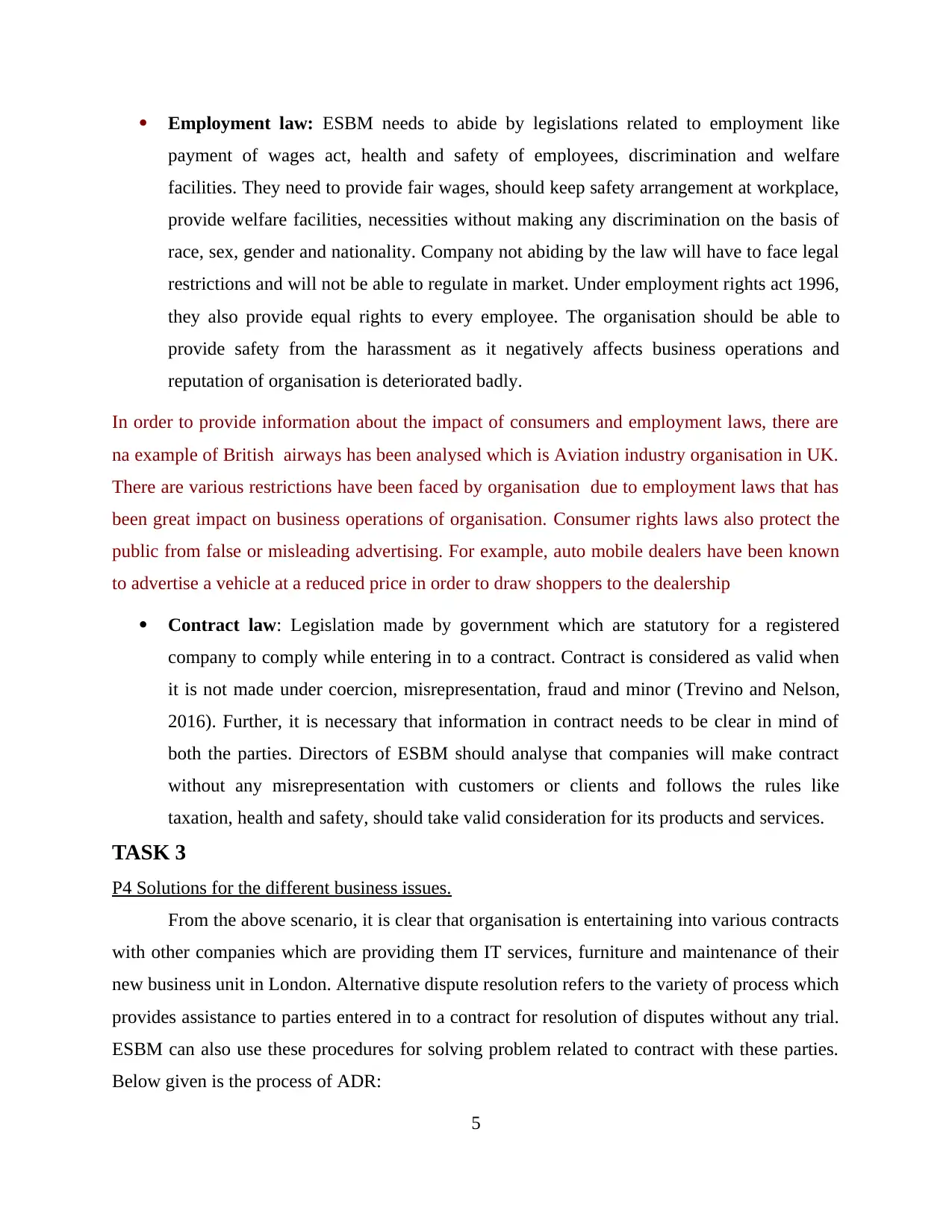
Employment law: ESBM needs to abide by legislations related to employment like
payment of wages act, health and safety of employees, discrimination and welfare
facilities. They need to provide fair wages, should keep safety arrangement at workplace,
provide welfare facilities, necessities without making any discrimination on the basis of
race, sex, gender and nationality. Company not abiding by the law will have to face legal
restrictions and will not be able to regulate in market. Under employment rights act 1996,
they also provide equal rights to every employee. The organisation should be able to
provide safety from the harassment as it negatively affects business operations and
reputation of organisation is deteriorated badly.
In order to provide information about the impact of consumers and employment laws, there are
na example of British airways has been analysed which is Aviation industry organisation in UK.
There are various restrictions have been faced by organisation due to employment laws that has
been great impact on business operations of organisation. Consumer rights laws also protect the
public from false or misleading advertising. For example, auto mobile dealers have been known
to advertise a vehicle at a reduced price in order to draw shoppers to the dealership
Contract law: Legislation made by government which are statutory for a registered
company to comply while entering in to a contract. Contract is considered as valid when
it is not made under coercion, misrepresentation, fraud and minor (Trevino and Nelson,
2016). Further, it is necessary that information in contract needs to be clear in mind of
both the parties. Directors of ESBM should analyse that companies will make contract
without any misrepresentation with customers or clients and follows the rules like
taxation, health and safety, should take valid consideration for its products and services.
TASK 3
P4 Solutions for the different business issues.
From the above scenario, it is clear that organisation is entertaining into various contracts
with other companies which are providing them IT services, furniture and maintenance of their
new business unit in London. Alternative dispute resolution refers to the variety of process which
provides assistance to parties entered in to a contract for resolution of disputes without any trial.
ESBM can also use these procedures for solving problem related to contract with these parties.
Below given is the process of ADR:
5
payment of wages act, health and safety of employees, discrimination and welfare
facilities. They need to provide fair wages, should keep safety arrangement at workplace,
provide welfare facilities, necessities without making any discrimination on the basis of
race, sex, gender and nationality. Company not abiding by the law will have to face legal
restrictions and will not be able to regulate in market. Under employment rights act 1996,
they also provide equal rights to every employee. The organisation should be able to
provide safety from the harassment as it negatively affects business operations and
reputation of organisation is deteriorated badly.
In order to provide information about the impact of consumers and employment laws, there are
na example of British airways has been analysed which is Aviation industry organisation in UK.
There are various restrictions have been faced by organisation due to employment laws that has
been great impact on business operations of organisation. Consumer rights laws also protect the
public from false or misleading advertising. For example, auto mobile dealers have been known
to advertise a vehicle at a reduced price in order to draw shoppers to the dealership
Contract law: Legislation made by government which are statutory for a registered
company to comply while entering in to a contract. Contract is considered as valid when
it is not made under coercion, misrepresentation, fraud and minor (Trevino and Nelson,
2016). Further, it is necessary that information in contract needs to be clear in mind of
both the parties. Directors of ESBM should analyse that companies will make contract
without any misrepresentation with customers or clients and follows the rules like
taxation, health and safety, should take valid consideration for its products and services.
TASK 3
P4 Solutions for the different business issues.
From the above scenario, it is clear that organisation is entertaining into various contracts
with other companies which are providing them IT services, furniture and maintenance of their
new business unit in London. Alternative dispute resolution refers to the variety of process which
provides assistance to parties entered in to a contract for resolution of disputes without any trial.
ESBM can also use these procedures for solving problem related to contract with these parties.
Below given is the process of ADR:
5
Paraphrase This Document
Need a fresh take? Get an instant paraphrase of this document with our AI Paraphraser
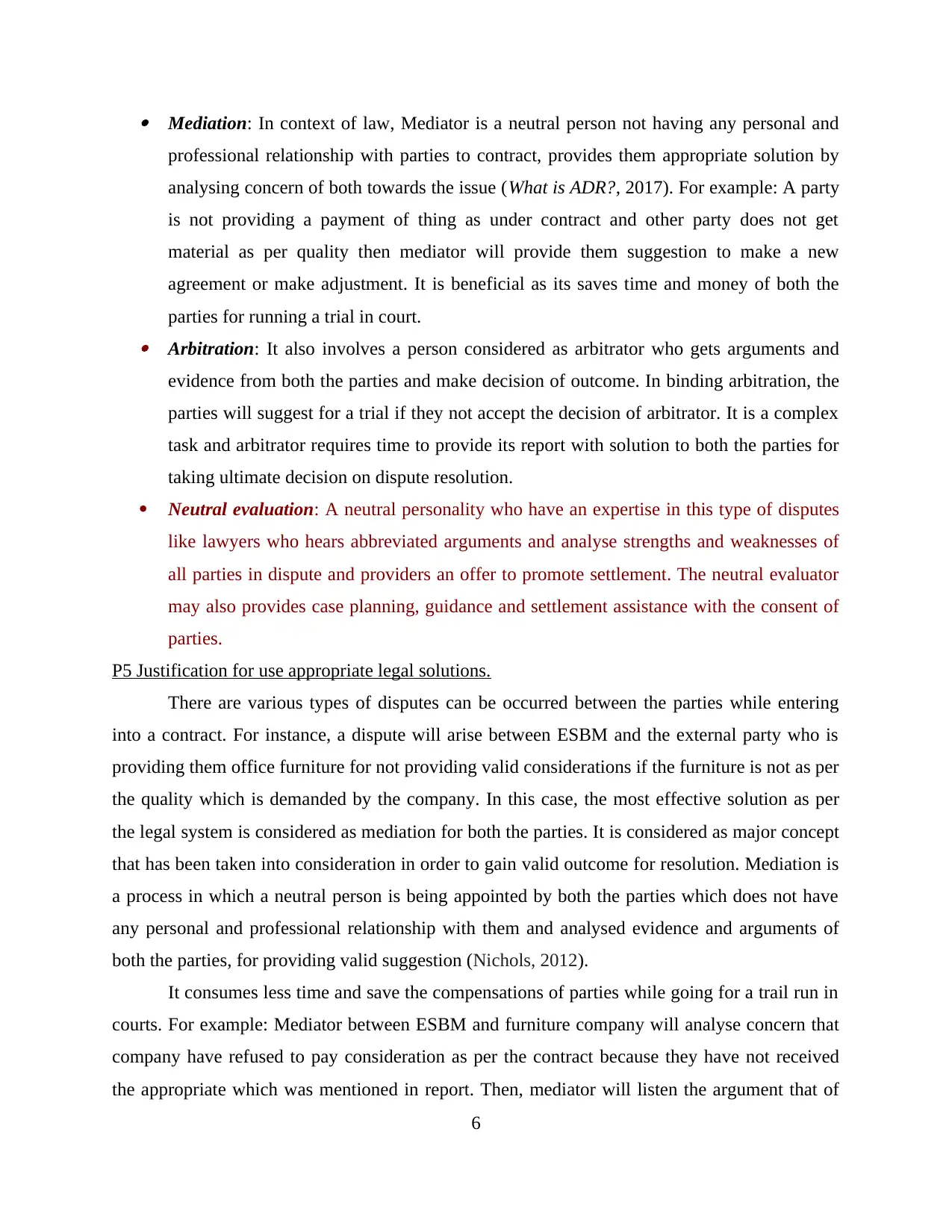
Mediation: In context of law, Mediator is a neutral person not having any personal and
professional relationship with parties to contract, provides them appropriate solution by
analysing concern of both towards the issue (What is ADR?, 2017). For example: A party
is not providing a payment of thing as under contract and other party does not get
material as per quality then mediator will provide them suggestion to make a new
agreement or make adjustment. It is beneficial as its saves time and money of both the
parties for running a trial in court. Arbitration: It also involves a person considered as arbitrator who gets arguments and
evidence from both the parties and make decision of outcome. In binding arbitration, the
parties will suggest for a trial if they not accept the decision of arbitrator. It is a complex
task and arbitrator requires time to provide its report with solution to both the parties for
taking ultimate decision on dispute resolution.
Neutral evaluation: A neutral personality who have an expertise in this type of disputes
like lawyers who hears abbreviated arguments and analyse strengths and weaknesses of
all parties in dispute and providers an offer to promote settlement. The neutral evaluator
may also provides case planning, guidance and settlement assistance with the consent of
parties.
P5 Justification for use appropriate legal solutions.
There are various types of disputes can be occurred between the parties while entering
into a contract. For instance, a dispute will arise between ESBM and the external party who is
providing them office furniture for not providing valid considerations if the furniture is not as per
the quality which is demanded by the company. In this case, the most effective solution as per
the legal system is considered as mediation for both the parties. It is considered as major concept
that has been taken into consideration in order to gain valid outcome for resolution. Mediation is
a process in which a neutral person is being appointed by both the parties which does not have
any personal and professional relationship with them and analysed evidence and arguments of
both the parties, for providing valid suggestion (Nichols, 2012).
It consumes less time and save the compensations of parties while going for a trail run in
courts. For example: Mediator between ESBM and furniture company will analyse concern that
company have refused to pay consideration as per the contract because they have not received
the appropriate which was mentioned in report. Then, mediator will listen the argument that of
6
professional relationship with parties to contract, provides them appropriate solution by
analysing concern of both towards the issue (What is ADR?, 2017). For example: A party
is not providing a payment of thing as under contract and other party does not get
material as per quality then mediator will provide them suggestion to make a new
agreement or make adjustment. It is beneficial as its saves time and money of both the
parties for running a trial in court. Arbitration: It also involves a person considered as arbitrator who gets arguments and
evidence from both the parties and make decision of outcome. In binding arbitration, the
parties will suggest for a trial if they not accept the decision of arbitrator. It is a complex
task and arbitrator requires time to provide its report with solution to both the parties for
taking ultimate decision on dispute resolution.
Neutral evaluation: A neutral personality who have an expertise in this type of disputes
like lawyers who hears abbreviated arguments and analyse strengths and weaknesses of
all parties in dispute and providers an offer to promote settlement. The neutral evaluator
may also provides case planning, guidance and settlement assistance with the consent of
parties.
P5 Justification for use appropriate legal solutions.
There are various types of disputes can be occurred between the parties while entering
into a contract. For instance, a dispute will arise between ESBM and the external party who is
providing them office furniture for not providing valid considerations if the furniture is not as per
the quality which is demanded by the company. In this case, the most effective solution as per
the legal system is considered as mediation for both the parties. It is considered as major concept
that has been taken into consideration in order to gain valid outcome for resolution. Mediation is
a process in which a neutral person is being appointed by both the parties which does not have
any personal and professional relationship with them and analysed evidence and arguments of
both the parties, for providing valid suggestion (Nichols, 2012).
It consumes less time and save the compensations of parties while going for a trail run in
courts. For example: Mediator between ESBM and furniture company will analyse concern that
company have refused to pay consideration as per the contract because they have not received
the appropriate which was mentioned in report. Then, mediator will listen the argument that of
6
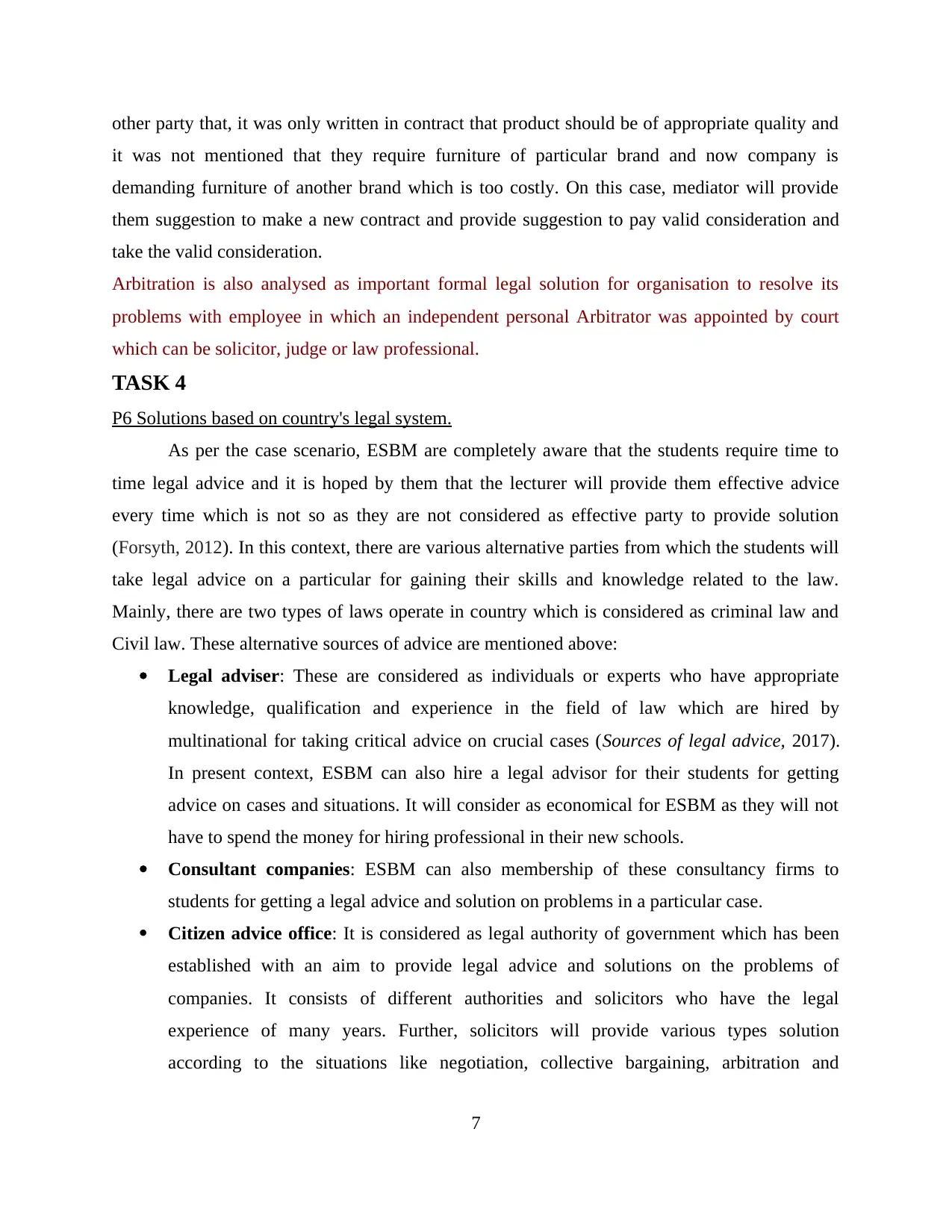
other party that, it was only written in contract that product should be of appropriate quality and
it was not mentioned that they require furniture of particular brand and now company is
demanding furniture of another brand which is too costly. On this case, mediator will provide
them suggestion to make a new contract and provide suggestion to pay valid consideration and
take the valid consideration.
Arbitration is also analysed as important formal legal solution for organisation to resolve its
problems with employee in which an independent personal Arbitrator was appointed by court
which can be solicitor, judge or law professional.
TASK 4
P6 Solutions based on country's legal system.
As per the case scenario, ESBM are completely aware that the students require time to
time legal advice and it is hoped by them that the lecturer will provide them effective advice
every time which is not so as they are not considered as effective party to provide solution
(Forsyth, 2012). In this context, there are various alternative parties from which the students will
take legal advice on a particular for gaining their skills and knowledge related to the law.
Mainly, there are two types of laws operate in country which is considered as criminal law and
Civil law. These alternative sources of advice are mentioned above:
Legal adviser: These are considered as individuals or experts who have appropriate
knowledge, qualification and experience in the field of law which are hired by
multinational for taking critical advice on crucial cases (Sources of legal advice, 2017).
In present context, ESBM can also hire a legal advisor for their students for getting
advice on cases and situations. It will consider as economical for ESBM as they will not
have to spend the money for hiring professional in their new schools.
Consultant companies: ESBM can also membership of these consultancy firms to
students for getting a legal advice and solution on problems in a particular case.
Citizen advice office: It is considered as legal authority of government which has been
established with an aim to provide legal advice and solutions on the problems of
companies. It consists of different authorities and solicitors who have the legal
experience of many years. Further, solicitors will provide various types solution
according to the situations like negotiation, collective bargaining, arbitration and
7
it was not mentioned that they require furniture of particular brand and now company is
demanding furniture of another brand which is too costly. On this case, mediator will provide
them suggestion to make a new contract and provide suggestion to pay valid consideration and
take the valid consideration.
Arbitration is also analysed as important formal legal solution for organisation to resolve its
problems with employee in which an independent personal Arbitrator was appointed by court
which can be solicitor, judge or law professional.
TASK 4
P6 Solutions based on country's legal system.
As per the case scenario, ESBM are completely aware that the students require time to
time legal advice and it is hoped by them that the lecturer will provide them effective advice
every time which is not so as they are not considered as effective party to provide solution
(Forsyth, 2012). In this context, there are various alternative parties from which the students will
take legal advice on a particular for gaining their skills and knowledge related to the law.
Mainly, there are two types of laws operate in country which is considered as criminal law and
Civil law. These alternative sources of advice are mentioned above:
Legal adviser: These are considered as individuals or experts who have appropriate
knowledge, qualification and experience in the field of law which are hired by
multinational for taking critical advice on crucial cases (Sources of legal advice, 2017).
In present context, ESBM can also hire a legal advisor for their students for getting
advice on cases and situations. It will consider as economical for ESBM as they will not
have to spend the money for hiring professional in their new schools.
Consultant companies: ESBM can also membership of these consultancy firms to
students for getting a legal advice and solution on problems in a particular case.
Citizen advice office: It is considered as legal authority of government which has been
established with an aim to provide legal advice and solutions on the problems of
companies. It consists of different authorities and solicitors who have the legal
experience of many years. Further, solicitors will provide various types solution
according to the situations like negotiation, collective bargaining, arbitration and
7
⊘ This is a preview!⊘
Do you want full access?
Subscribe today to unlock all pages.

Trusted by 1+ million students worldwide
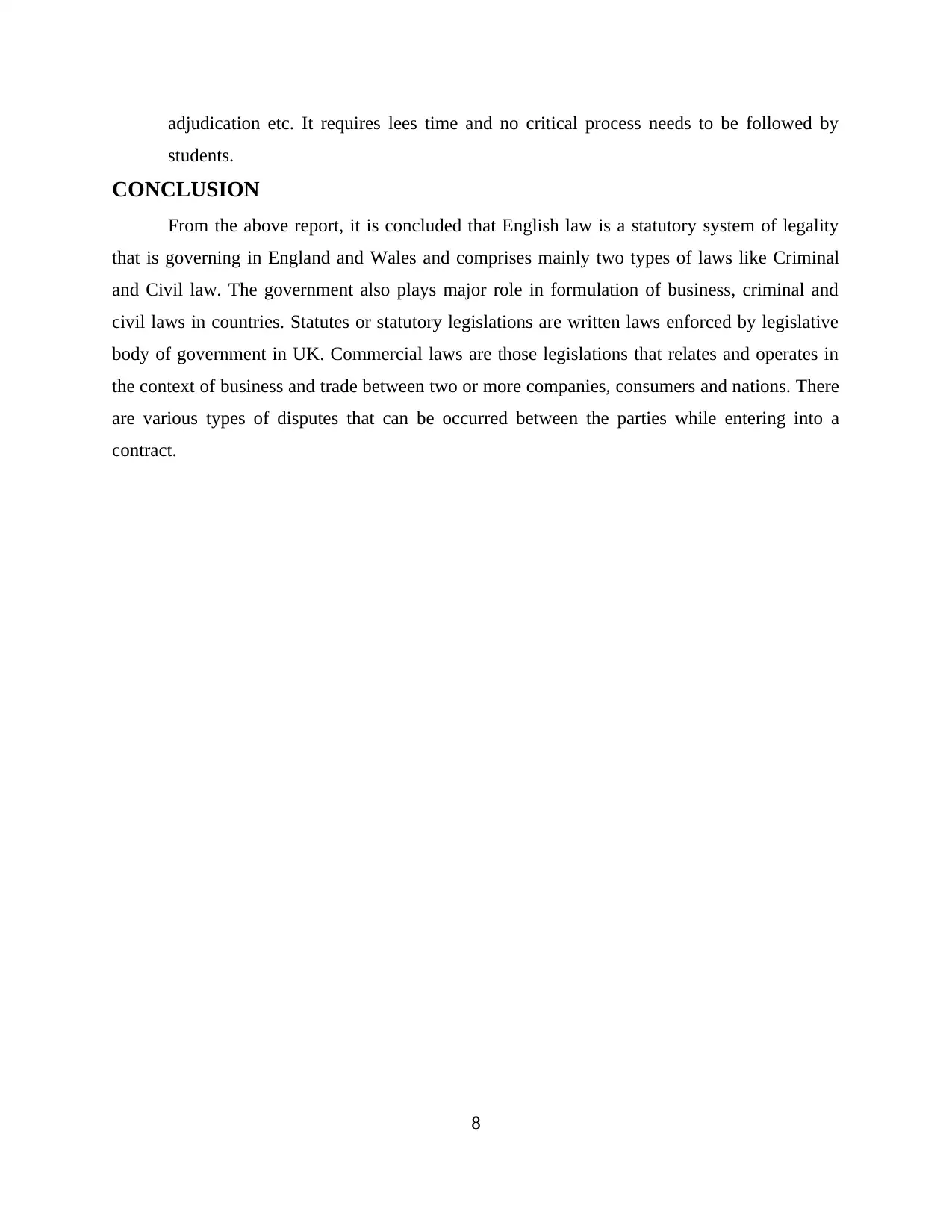
adjudication etc. It requires lees time and no critical process needs to be followed by
students.
CONCLUSION
From the above report, it is concluded that English law is a statutory system of legality
that is governing in England and Wales and comprises mainly two types of laws like Criminal
and Civil law. The government also plays major role in formulation of business, criminal and
civil laws in countries. Statutes or statutory legislations are written laws enforced by legislative
body of government in UK. Commercial laws are those legislations that relates and operates in
the context of business and trade between two or more companies, consumers and nations. There
are various types of disputes that can be occurred between the parties while entering into a
contract.
8
students.
CONCLUSION
From the above report, it is concluded that English law is a statutory system of legality
that is governing in England and Wales and comprises mainly two types of laws like Criminal
and Civil law. The government also plays major role in formulation of business, criminal and
civil laws in countries. Statutes or statutory legislations are written laws enforced by legislative
body of government in UK. Commercial laws are those legislations that relates and operates in
the context of business and trade between two or more companies, consumers and nations. There
are various types of disputes that can be occurred between the parties while entering into a
contract.
8
Paraphrase This Document
Need a fresh take? Get an instant paraphrase of this document with our AI Paraphraser
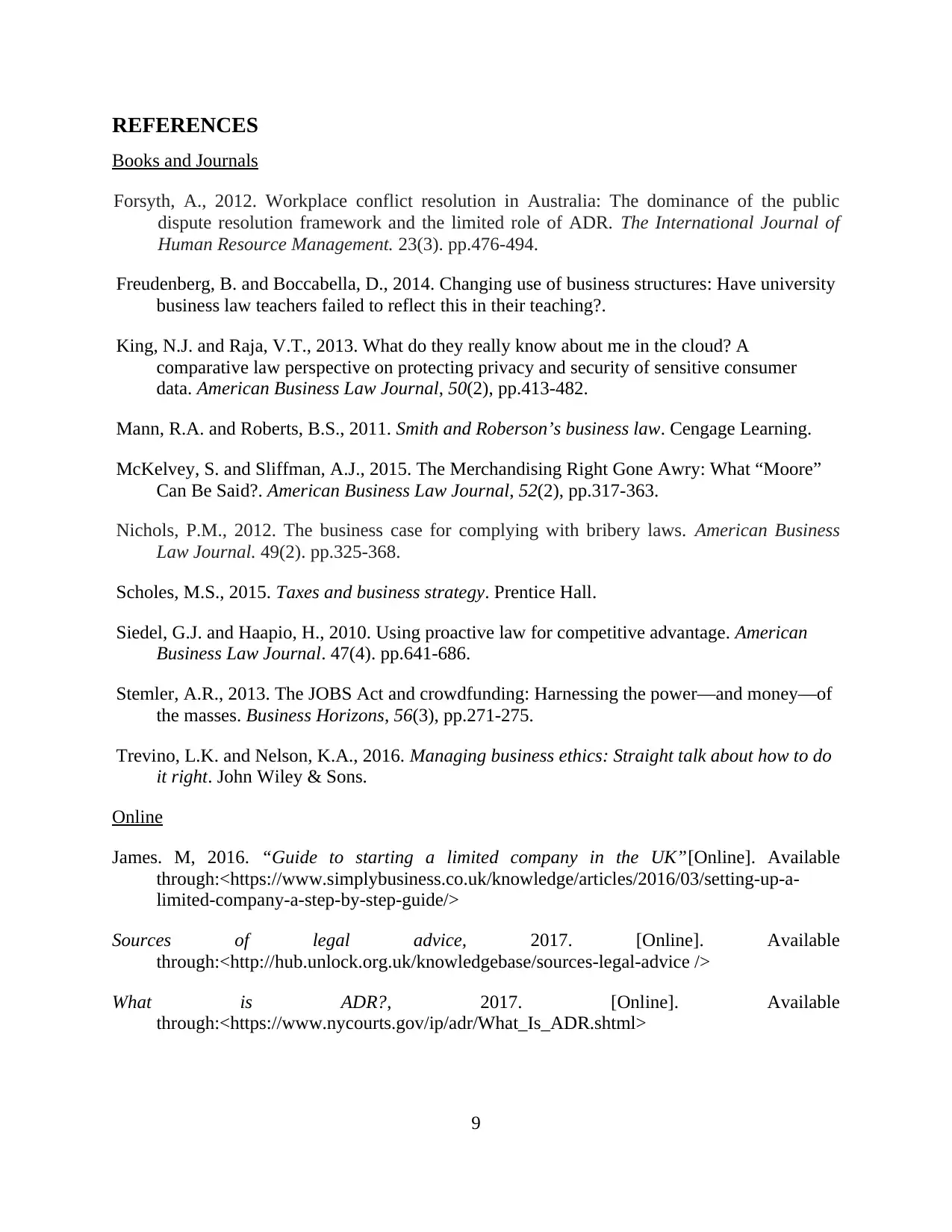
REFERENCES
Books and Journals
Forsyth, A., 2012. Workplace conflict resolution in Australia: The dominance of the public
dispute resolution framework and the limited role of ADR. The International Journal of
Human Resource Management. 23(3). pp.476-494.
Freudenberg, B. and Boccabella, D., 2014. Changing use of business structures: Have university
business law teachers failed to reflect this in their teaching?.
King, N.J. and Raja, V.T., 2013. What do they really know about me in the cloud? A
comparative law perspective on protecting privacy and security of sensitive consumer
data. American Business Law Journal, 50(2), pp.413-482.
Mann, R.A. and Roberts, B.S., 2011. Smith and Roberson’s business law. Cengage Learning.
McKelvey, S. and Sliffman, A.J., 2015. The Merchandising Right Gone Awry: What “Moore”
Can Be Said?. American Business Law Journal, 52(2), pp.317-363.
Nichols, P.M., 2012. The business case for complying with bribery laws. American Business
Law Journal. 49(2). pp.325-368.
Scholes, M.S., 2015. Taxes and business strategy. Prentice Hall.
Siedel, G.J. and Haapio, H., 2010. Using proactive law for competitive advantage. American
Business Law Journal. 47(4). pp.641-686.
Stemler, A.R., 2013. The JOBS Act and crowdfunding: Harnessing the power—and money—of
the masses. Business Horizons, 56(3), pp.271-275.
Trevino, L.K. and Nelson, K.A., 2016. Managing business ethics: Straight talk about how to do
it right. John Wiley & Sons.
Online
James. M, 2016. “Guide to starting a limited company in the UK”[Online]. Available
through:<https://www.simplybusiness.co.uk/knowledge/articles/2016/03/setting-up-a-
limited-company-a-step-by-step-guide/>
Sources of legal advice, 2017. [Online]. Available
through:<http://hub.unlock.org.uk/knowledgebase/sources-legal-advice />
What is ADR?, 2017. [Online]. Available
through:<https://www.nycourts.gov/ip/adr/What_Is_ADR.shtml>
9
Books and Journals
Forsyth, A., 2012. Workplace conflict resolution in Australia: The dominance of the public
dispute resolution framework and the limited role of ADR. The International Journal of
Human Resource Management. 23(3). pp.476-494.
Freudenberg, B. and Boccabella, D., 2014. Changing use of business structures: Have university
business law teachers failed to reflect this in their teaching?.
King, N.J. and Raja, V.T., 2013. What do they really know about me in the cloud? A
comparative law perspective on protecting privacy and security of sensitive consumer
data. American Business Law Journal, 50(2), pp.413-482.
Mann, R.A. and Roberts, B.S., 2011. Smith and Roberson’s business law. Cengage Learning.
McKelvey, S. and Sliffman, A.J., 2015. The Merchandising Right Gone Awry: What “Moore”
Can Be Said?. American Business Law Journal, 52(2), pp.317-363.
Nichols, P.M., 2012. The business case for complying with bribery laws. American Business
Law Journal. 49(2). pp.325-368.
Scholes, M.S., 2015. Taxes and business strategy. Prentice Hall.
Siedel, G.J. and Haapio, H., 2010. Using proactive law for competitive advantage. American
Business Law Journal. 47(4). pp.641-686.
Stemler, A.R., 2013. The JOBS Act and crowdfunding: Harnessing the power—and money—of
the masses. Business Horizons, 56(3), pp.271-275.
Trevino, L.K. and Nelson, K.A., 2016. Managing business ethics: Straight talk about how to do
it right. John Wiley & Sons.
Online
James. M, 2016. “Guide to starting a limited company in the UK”[Online]. Available
through:<https://www.simplybusiness.co.uk/knowledge/articles/2016/03/setting-up-a-
limited-company-a-step-by-step-guide/>
Sources of legal advice, 2017. [Online]. Available
through:<http://hub.unlock.org.uk/knowledgebase/sources-legal-advice />
What is ADR?, 2017. [Online]. Available
through:<https://www.nycourts.gov/ip/adr/What_Is_ADR.shtml>
9
1 out of 11
Related Documents
Your All-in-One AI-Powered Toolkit for Academic Success.
+13062052269
info@desklib.com
Available 24*7 on WhatsApp / Email
![[object Object]](/_next/static/media/star-bottom.7253800d.svg)
Unlock your academic potential
Copyright © 2020–2025 A2Z Services. All Rights Reserved. Developed and managed by ZUCOL.





